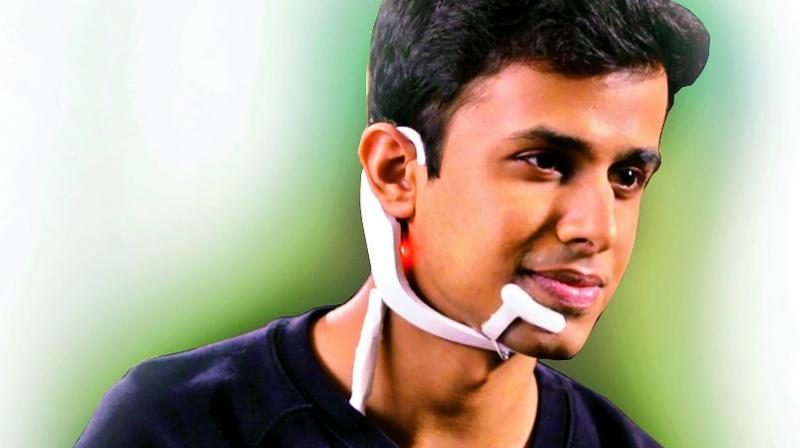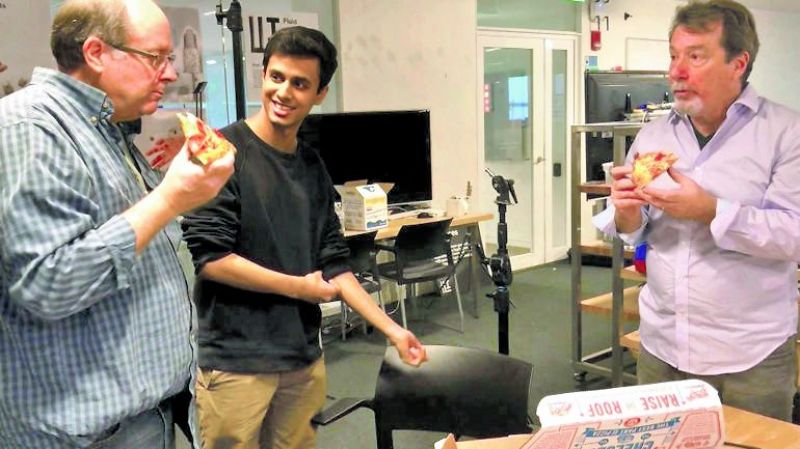The BESPOKE scientist
Arnav Kapur, scientist, and inventor of Alter ego, which “speaks silently†is at the helm of innovative strides.

For a 23-year-old to be deep into research might not be unique if he is a scientific-minded bloke. But for a thinking genius who also composes music, and mulls over a palette of hues when not embedded in ground-breaking solutions is brilliance at play. But that again is not what we are talking about. Trying to address the AI and human conundrum is what MIT graduate and Harvard Medical School fellow Arnav Kapur’s new device inadvertently does. Pertinent in an age where privacy and AI is under constant scrutiny, Kapur wants to put humans back at the centre of all leaps with AlterEgo, his latest innovation. It was created under Dr Maes’s guidance by Arnav Kapur and his brother Shreyas, an undergrad student. Catapulted into the limelight with his “silent speaking” wearable device, his incisive mind is adept at finding not obvious solutions by changing perspective which has led to a burgeoning of technological breakthroughs.
“If one would look at computing history — we’ve always designed and built computers as external tools. But what if we pause and put the human being at the centre — and design and engineer technologies that help people. AlterEgo seeks to re-imagine the computer by putting the human being at the centre — and weaving computing, Internet and AI within human beings, such that these feel like an internal part. I wanted to create a high-bandwidth information channel between a human being and a computer,” says Arnav, who feels it is an extension of ourselves through internal silent conversation, a computer interface that can transcribe words that the user verbalises internally but does not actually speak aloud, which is enabled by electrodes on the face and jaw that pick up undetectable neuromuscular activity. Yes, complicated.
For a layman, Arnav elaborates, “Imagine the knowledge of the entire Internet in one’s head. This would enable AI to be a part of a person, such that AI augments humans rather than replaces us. A human doctor could internally converse with an intelligent medical-AI to receive advice. One could communicate with another without voicing anything through voiceless silent calling, by internally talking with complete privacy. One could internally speak information that needed to be remembered, and retrieve later. People who suffer from speech impediments, such as cancer of the mouth, mid-stage ALS, stroke patients could potentially communicate. AlterEgo aims to couple humans and machines together to cognitively augment humans.”
Not convinced? Kapur assures, “It is 92 per cent accurate, we are constantly working on improving accuracy levels. It’s like a sweet spot in between random thinking and talking — which is both deliberate but completely private. AlterEgo does not detect twitches/movements, instead it measures very subtle neuromuscular electrical activity of internal speech organs, non-invasively from the surface of the skin.” The MIT Media Lab is this graduate’s workspace, and his laboratory is the world of unanswered questions. At the heart of his pioneering ideas lies a mind that treads towards extraordinary solutions to ordinary questions. “I view different disciplines as different lenses, which look at the world from different angles but still try to explain the same world. The traditional structure in a career is to focus deep into a field — be it arts, sciences, engineering, business etc. While that is an incredibly impressive feat, I believe you also need perspectives that connect the dots across disciplines. I sit at the centre of dissimilar disciplines in the hope of realising something new and unusual — that forms my day job,” says the scientist.
Earlier, as a researcher at Harvard Medical School, Arnav had invented a platform which measured human gene expression levels. “The measurement of the association between genes and diseases can tell us a lot about diagnosis. For instance, a patient who has a tumour developing in the breast would often undergo a gene test. Such tests cost '3 lakh. The hope is that such architecture would dramatically reduce costs,” explains Arnav who is busy challenging the boundaries of thought with a radical approach to problems. Kapur had also co-developed a collaborative machine intelligence artist, which was exhibited at Future Late — Tate Modern London, Alt-AI New York, etc. Clearly, beyond science Kapur straddles diverse disciplines. His artistic leaning is musical too. “I like to compose music. I like thinking about tunes and colour palettes while walking from one place to another,” he reveals.
Many inventions in his kitty, the more he unearths, the greater is his quest. “I’ve loved the sciences, math, building and arts since I was a kid — for as long as I can remember. I think my way of doing things is still the same, for better or worse. I love every single second of exploring — it is the reason why I do what I do.” On the Cambridge Analytica scandal, and data manipulation, for Arnav, privacy is a fundamental right. He admits that the problems surrounding technology and privacy are much more serious, “I believe privacy is about protection of information rather than concealment. The user’s movements online are continuously recorded — and the same users can then be easy targets.
 Arnav Kapur in a file photograph ordering a pizza through the ‘speaking silently’ device. Kapur was on 60 Minutes, where he ordered a pizza silently!
Arnav Kapur in a file photograph ordering a pizza through the ‘speaking silently’ device. Kapur was on 60 Minutes, where he ordered a pizza silently!
The general public should be made more aware of how their information is stored and tracked online, and it’s implications. The conversation should involve stakeholders and governments. For instance, a positive example is the European Union recently imposing strict rules to protect user privacy. While we are not close to the right regulations and understanding, it is a small step in a positive direction,” adding, “AlterEgo does not intrude a person’s privacy or thoughts since it does not measure direct brain activity and has no direct access to it, which is key. This is a basis of our design, and to that end.”
Out-of-the-box thinking, Arnav is also outdoorsy, busting the myth about all work and no play with elan, “I do like hiking, and climbing. I have been to multiple camps in Himachal, and Uttarakhand over the years — it’s now been a while since I’ve gone back,” says Arnav who recalls his younger days in Delhi where he developed a love for the arts, yes, and also filmaking. “I also like film-making. My favourite thing in the summer, when I was in school, used to be the Shatabdi train that I used to take from Delhi — and look outside the window. It used to be the most entertaining and inspiring six hour movie,” says Arnav with the expectancy of a child. To aspiring young scientists in India, he says, “Keep it simple: Be ambitious, genuine, innocent and passionate. There is no dearth of important problems to be solved — pick and choose your favourite problem to work on, with the right sense of urgency.” Sensible words. If life is a learning, Arnav Kapur stands at the crux of innovations and leaps. A life that has already ignited a silent reel of explorations, there is much more to expect from him.

